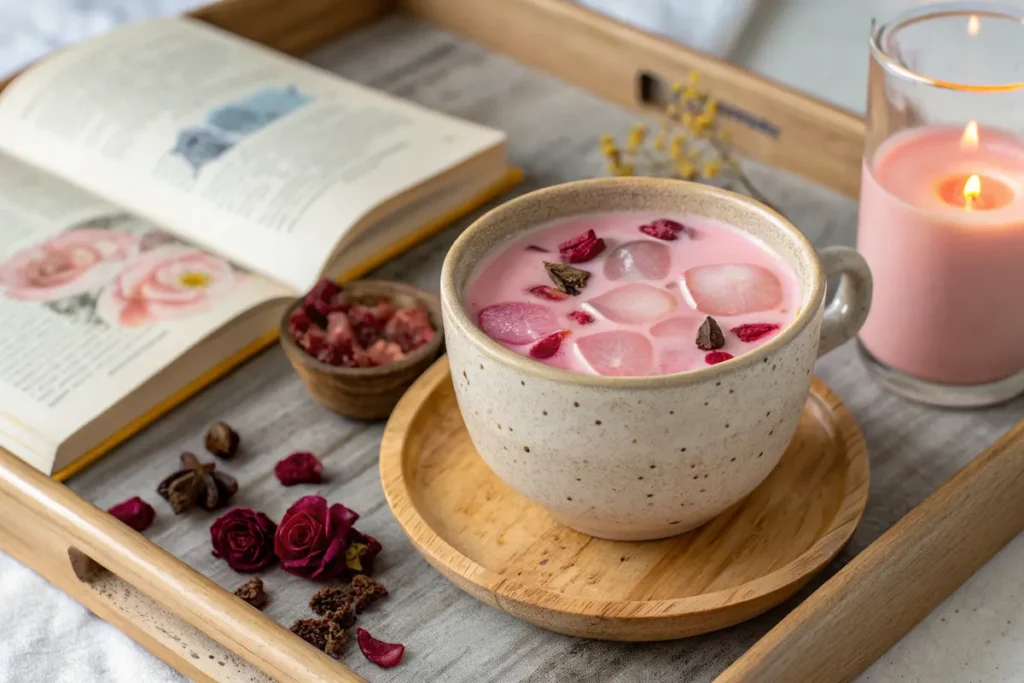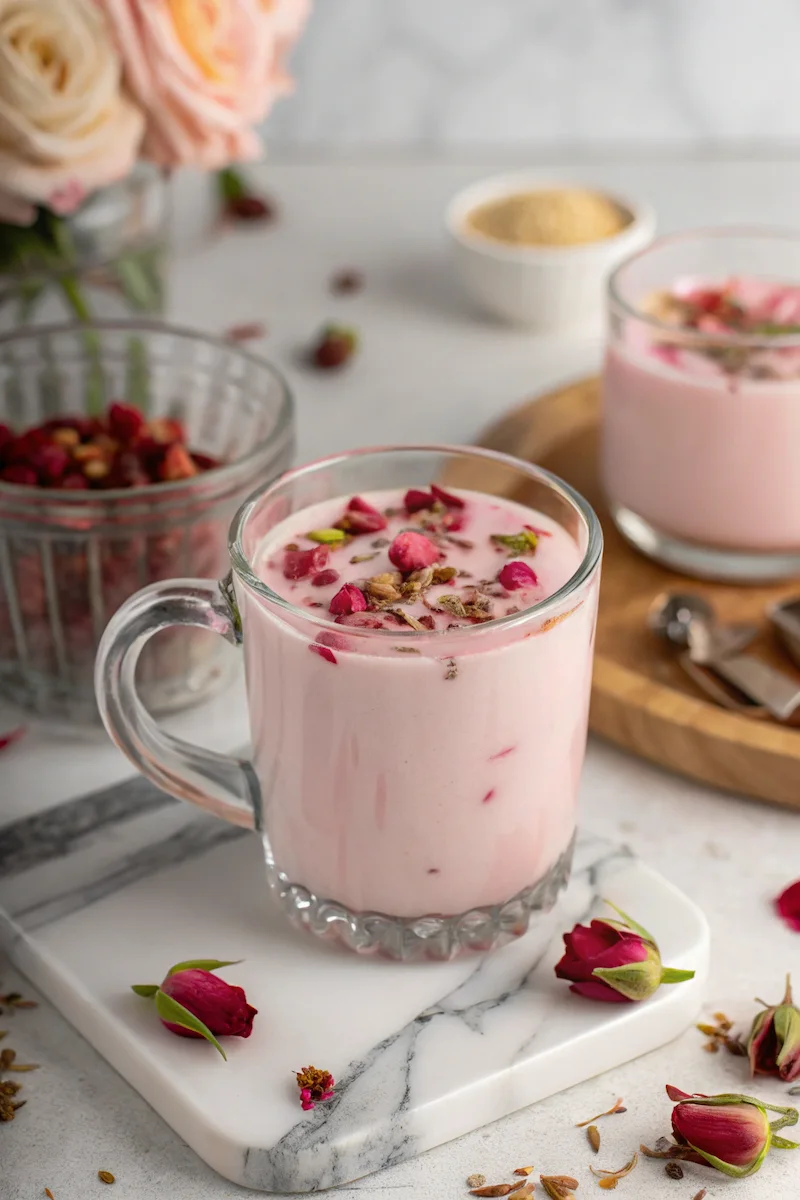Imagine a gentle warmth, a delicate floral whisper, and a soothing creaminess all in one sip. That’s the understated elegance of Rose Tea Milk – a simple yet profoundly comforting infusion where the essence of rose truly blossoms within the milk itself. Unlike floral milk teas that start with brewed tea, this drink focuses on gently steeping edible rose petals or buds directly into milk, resulting in a luxurious, calming drink that feels both ancient and timeless.
Rose Tea Milk stands out for its subtle, aromatic flavor and relaxing properties. It’s not only a calming beverage but also a base ingredient you can use creatively in smoothies, lattes, or even custards. Whether you sip it warm before bed or add it to your morning oats, it brings a moment of floral serenity to your day.
This guide will explore the art of creating exquisite Rose Tea Milk, detailing infusion methods, exploring its diverse uses in drinks and dishes, and highlighting its calming benefits for a touch of daily serenity.
Table of Contents
The Gentle Embrace: Crafting and Using Rose Tea Milk
A delicately floral and creamy infusion that brings soothing comfort in every sip—perfect warm or iced, and versatile enough for smoothies or baking.
- Prep Time: 5 minutes
- Cook Time: 10 minutes
- Total Time: 15 minutes
- Yield: 2 servings 1x
- Category: Beverage
- Method: Stovetop
- Cuisine: Fusion
Ingredients
- 2 cups of milk (whole, 2%, or plant-based like oat or almond milk)
- 1–2 tablespoons dried rose petals or buds (culinary grade)
- Optional: 1–2 teaspoons honey or maple syrup
Instructions
- Pour milk into a heavy-bottomed saucepan.
- Add the rose petals and heat gently on low to medium (do not boil).
- Let steep for 5–10 minutes, stirring occasionally.
- Strain out the petals using a fine mesh sieve.
- Optionally, stir in sweetener while still warm.
Notes
Use only food-grade dried rose petals. For cold infusion, combine ingredients and refrigerate 6–12 hours, then strain. Ideal for bedtime, smoothies, or baking.
Nutrition
- Serving Size: 1 cup
- Calories: 120
- Sugar: 6g
- Sodium: 90mg
- Fat: 5g
- Saturated Fat: 3g
- Unsaturated Fat: 2g
- Trans Fat: 0g
- Carbohydrates: 12g
- Fiber: 0g
- Protein: 4g
- Cholesterol: 15mg

The Core Components: Understanding Rose and Milk for Infusion
Choosing Your Rose: Quality for Delicate Infusion
The soul of this drink lies in the rose you choose. The best option is dried, food-grade rose petals or buds. Make sure they’re labeled for culinary use and free of pesticides or chemical treatments. Look for varieties like Damask or Rosa Centifolia, which release a naturally sweet, floral aroma.
While rose water offers a shortcut, direct infusion brings more depth and gentleness to the drink. Rose water can overpower, whereas petals give you the freedom to adjust flavor intensity. Gently simmered, the petals release notes that are sweet, lightly earthy, and truly elegant.
Avoid rose petals from bouquets, which are usually treated with chemicals and lack proper flavor.
Selecting the Perfect Milk for Infusion
For dairy lovers, whole milk delivers the creamiest result and carries the rose flavor beautifully. If you prefer something lighter, 2% milk still works well and balances richness with drinkability.
Plant-based milks are also fantastic:
- Oat milk has a mild, creamy body that readily absorbs rose essence, making it ideal for rose-infused drinks.
- Almond milk (unsweetened) adds a subtle nuttiness that complements floral tones without clashing.
- Light coconut milk, popular in floral drinks like our Coconut Milk Green Tea, introduces a tropical whisper that harmonizes beautifully with rose.
Why does this infusion work so well? Because milk contains fats that bind with rose’s aromatic compounds, helping them infuse deeply. The result is more than scented milk—it’s a delicately layered flavor experience.
Crafting Your Rose Tea Milk: Infusion Methods
The Gentle Simmer Method (Recommended)
The gentle simmer method is ideal for unlocking the full floral potential of your rose petals while preserving the milk’s smooth texture.
Ingredients:
- 2 cups of milk (dairy or plant-based)
- 1–2 tablespoons dried rose petals or buds (culinary grade)
- Optional: 1–2 teaspoons of honey, maple syrup, or other light sweetener
Instructions:
- Preparation: Measure out your milk and rose petals.
- Gentle Heat: Pour the milk into a heavy-bottomed saucepan and add the rose petals. Heat gently on low to medium—never boil.
- Steeping/Infusion: Let the mixture steep for 5 to 10 minutes, stirring occasionally. You’ll notice the aroma gradually building.
- Straining: Once infused to your liking, remove from heat and strain out the petals using a fine mesh sieve.
- Sweetening (Optional): Add your sweetener while the milk is still warm and stir until fully dissolved.
Pro Tips: Always use a thick saucepan to avoid scorching. Stir occasionally to prevent sticking. Taste as you go—over-infusion can cause bitterness. The result should be gently perfumed, never overwhelming.
Cold Infusion (for Subtle Notes & Ready-to-Use)
If you prefer a chilled option or want to prepare ahead, cold infusion is effortless and clean.
Simply combine milk and dried rose petals in a covered container, then refrigerate for 6 to 12 hours. The rose essence will extract slowly, resulting in a light, fresh floral flavor. Strain before using. This method is perfect for iced drinks, smoothies, or batters where you want a delicate rose presence without heat.
Troubleshooting Common Infusion Issues
- Too Bitter? You may have over-steeped, added too many petals, or heated the milk too much.
- Not Enough Flavor? Try a longer infusion time or slightly increase the rose quantity.
- Milk Separation? Most common with plant-based milks exposed to high heat. Stick to gentle temperatures.

Beyond the Sip: Versatile Uses of Rose Tea Milk
As a Soothing Beverage
On its own, rose tea milk is like a floral hug in a cup. Serve it warm as a bedtime drink, or pour it over ice for a cooling midday break. The rose aroma is calming, and the texture is silky smooth.
You can also make a simple rose latte by adding a shot of espresso or a mild green tea. This subtly flavored milk makes an excellent base for a Rose Milk Tea, especially if you prefer a lighter tea presence compared to traditional milk teas.
Culinary & Baking Applications
This milk isn’t just for sipping—it’s an ingredient with endless potential.
- Cereal & Oatmeal: Pour it over oats for a romantic breakfast.
- Smoothies: Combine with banana, raspberry, or coconut.
- Pancakes & Waffles: Use it in batter for a floral brunch twist.
- Custards or Pudding: Replace regular milk for a perfumed base.
- Ice Cream: Make homemade rose ice cream or popsicles.
- Coffee Creamer: A healthier, more elegant swap for artificial creamers.
- Mocktails: Use it as a base for dreamy non-alcoholic drinks.
If you love creative floral infusions, try exploring other blends like our Sakura Rose Milk Tea to expand your palate.
The Gentle Touch: Benefits & Calming Properties
Embracing Wellness and Calm
Rose Tea Milk isn’t just a pretty drink—it offers subtle wellness benefits that can make a meaningful difference in your day. The gentle aroma of rose is widely used in aromatherapy to ease stress and tension, making this beverage a perfect wind-down ritual in the evening or during anxious moments. Its warm, creamy texture also promotes a sense of comfort and presence.
This infusion supports gentle hydration, offering a more mindful alternative to plain water. While rose petals contain only modest amounts of antioxidants, their real benefit lies in their calming, digestive-soothing properties passed down through traditional herbal practices. Sipping rose tea milk slowly becomes a self-care moment—a pause that nourishes both body and mood with softness and serenity.
Conclusion: Your Gateway to Floral Serenity
Rose Tea Milk is a simple pleasure that invites calm into your routine. Whether served warm, iced, or baked into your favorite breakfast, it elevates the ordinary with a whisper of floral beauty.
It’s more than a drink—it’s a ritual, a fragrant pause, and a gentle hug from nature.
Try it once, and you’ll see how rose tea milk becomes a part of your everyday self-care, one sip at a time.
FAQs:
What is rose milk tea made of?
Rose milk tea is typically crafted by combining dried rose petals or rose water with a creamy milk base. Depending on the recipe, it may include a tea element like black or green tea, but in rose tea milk, the focus is on infusing rose directly into milk. Sweeteners like honey or simple syrup are often added to enhance the delicate floral flavor.
What does rose milk taste like?
Rose milk offers a light, fragrant flavor that’s sweet and floral with a soft, creamy finish. It has a unique aroma reminiscent of a blooming garden and a taste that’s both romantic and comforting. The flavor isn’t overpowering—it’s soothing, slightly sweet, and refreshingly elegant.
Is rose tea good with milk?
Yes, rose tea pairs beautifully with milk, especially when infused gently. Milk enhances the floral notes of rose without masking them, creating a smooth and aromatic drink. This pairing is especially popular in calming drinks and floral lattes like rose milk tea and rose tea milk.
What does rose tea taste like?
Rose tea has a delicate floral profile—mildly sweet, slightly tangy, and soothing. When steeped alone, it offers a pure botanical taste. When infused into milk, it transforms into a velvety beverage with subtle sweetness and a perfume-like fragrance that’s perfect for relaxation or as a wellness ritual.



1 thought on “The Gentle Embrace: Crafting and Using Rose Tea Milk”